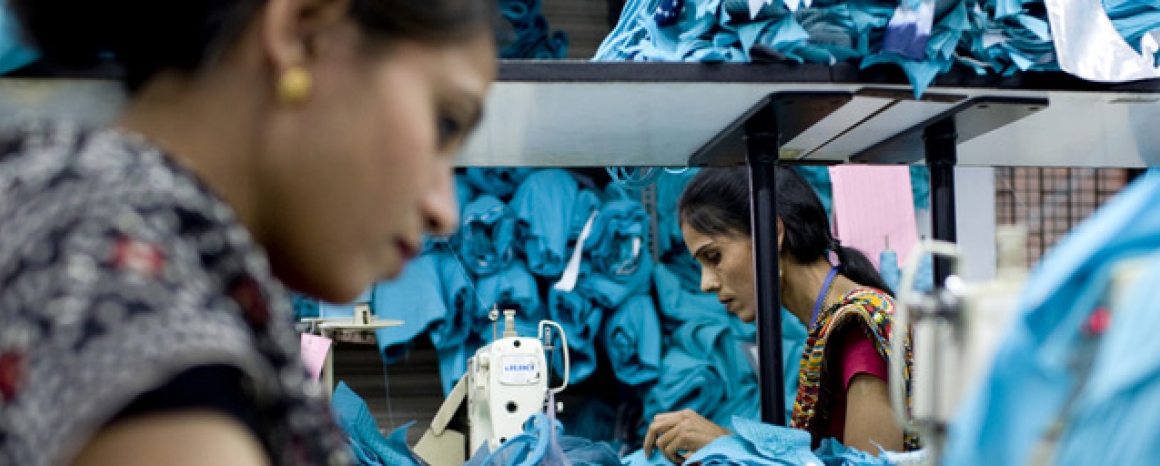Case studies

Debenhams – a journey towards worker representation

Maternity rights at a Tamil Nadu spinning mill

Peer to peer education: the Nalam programme


To contribute to the elimination of exploitive practices, including the Sumangali scheme, in the garment/textile industry in Southern India by implementing a replicable model that promotes ethical recruitment and retention of young women into the sector.
The Indus Valley, India, has played a significant role in the world’s history of garment production. If we stood here in the 5th millennium BC, we would have witnessed some of the earliest activities of cotton being spun, woven and dyed. You still see these same activities taking place today – except on a much larger scale. The region of Tamil Nadu is the power house of India’s export garments and textiles production.
India’s thriving textiles and garments sector plays a key role in the country’s economy and global trade. The sector contributes about 14 per cent to industrial production; 4 per cent to the country’s gross domestic product (GDP) and 17 per cent to export earnings (source: India Brand Equity Foundation). Much of the production is concentrated in Tamil Nadu, often referred to as the ‘textile valley of India’. Its garments and textiles sector exports globally and counts European and US brands and retailers amongst its clients.
In recent years, media and NGO reports have shone a spotlight on labour rights abuses within some parts of Tamil Nadu’s textile sector, which in the extreme, are tantamount to bonded labour. Issues include excessive working hours, withholding of wages, wages much below the minimum wages, lower level of personal health awareness, illness caused by exposure to cotton dust and no access to grievance mechanisms. While we recognise that these exploitative labour practices take place in some parts of Tamil Nadu’s garments and textiles sector which are unacceptable and must be addressed, our goal is not to vilify the sector; rather support its efforts to drive reform.
Our goal is to contribute towards a thriving, globally-responsive sector that offers positive opportunities for young women from rural areas to raise themselves out of poverty through decent work. We are committed to working with local stakeholders to drive positive change for the young women workers impacted by these exploitative practices. We firmly believe that all stakeholders need to be engaged, if we are to have any success at driving long-term and sector-wide change.
Since 2012, ETI has been working with our members and local stakeholders to bring together a critical mass of stakeholders that are committed to this change process. Our three-pronged programme approach was developed through a consultation process, and we are delivering it in collaboration with local stakeholders and is implemented on the ground by a local team with extensive experience of development work in Tamil Nadu. As part of their induction into the programme they met with over 260 potential, current and former mill and garment factory workers – this has given them an invaluable insight into the needs, concerns, hopes and fears of these vulnerable young women and placed them in a strong position to craft a programme that best addresses the issues that are important to them.
ETI’s five year programme aims to catalyse positive change within the industry through activities that empower young women workers, strengthen industrial relations, build community awareness and support legislative reform.
Our programme’s focus areas include:
Stakeholders (both ETI members and non-members) who are sourcing and active in Southern India.
ASDA/George
C&A
Gap Inc.
Inditex
M&S
Mothercare
Primark
Tesco
Boden
H&M
New Look
Otto Group
Tom Tailor
Ernstings Family
IndustriALL Global Union
HMS Union
INTUC
Anti-Slavery International
CARE International
Dalit Solidarity Network
Homeworkers Worldwide
Women Working Worldwide
Fairtrade Foundation
Martin Buttle, Category Leader – Apparel and textiles martin.buttle@eti.org.uk
A visit to Coimbatore, by ETI’s Apparel and Textiles Category Leader, Martin Buttle
Reframing the role of recruitment agents in Tamil Nadu’s textile sector, by ETI’s South India Programme Coordinator, Hedvees Christopher
Building trust in Tamil Nadu’s garment sector, by ETI’s Media Relations and Communications Manager, Esme Gibbins and Worker Peer Group Coordinator, Gayathri Jeganathan




